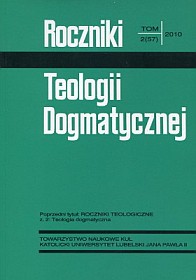Poznanie i metoda w teologii. Zasady podstawowe w ujęciu Josepha Ratzingera/Benedykta XVI
Abstrakt
The most characteristic trait of Pope Benedict XVI’s epistemological and methodological principles is his tendency to a synthesis and a kind of balance: natural and intuitive that results from his respect for the Truth. We approach this Truth by various ways of complimentary human efforts. If Benedict XVI speaks about the return to sources, he does not make any period of the history of the Church and theology absolute; he warns us against excessive “archeologisation” and “modernisation.” If he proposes a “research system”, he also proposes patience and equilibrium, “internal” direction and internal consequences of thinking (any “externality” appears banal and empty). He proposes “chain bonds” (of epochs, positions, and evolution of thinking) and dialectic holism (only pluralism that is referred to the unity of truth is great). One should notice questions and needs of the present time, but they cannot make up the criterion of answers. The point is to strike a proper balance of emphases between the past and the present. All this deals with the Church and theology whose mission is internally identical, that is the knowledge of God.

